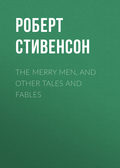
Роберт Льюис Стивенсон
In the South Seas
CHAPTER VII – THE KING OF APEMAMA
Thus all things on the island, even the priests of the gods, obey the word of Tembinok’. He can give and take, and slay, and allay the scruples of the conscientious, and do all things (apparently) but interfere in the cookery of a turtle. ‘I got power’ is his favourite word; it interlards his conversation; the thought haunts him and is ever fresh; and when be has asked and meditates of foreign countries, he looks up with a smile and reminds you, ‘I got Power.’ Nor is his delight only in the possession, but in the exercise. He rejoices in the crooked and violent paths of kingship like a strong man to run a race, or like an artist in his art. To feel, to use his power, to embellish his island and the picture of the island life after a private ideal, to milk the island vigorously, to extend his singular museum – these employ delightfully the sum of his abilities. I never saw a man more patently in the right trade.
It would be natural to suppose this monarchy inherited intact through generations. And so far from that, it is a thing of yesterday. I was already a boy at school while Apemama was yet republican, ruled by a noisy council of Old Men, and torn with incurable feuds. And Tembinok’ is no Bourbon; rather the son of a Napoleon. Of course he is well-born. No man need aspire high in the isles of the Pacific unless his pedigree be long and in the upper regions mythical. And our king counts cousinship with most of the high families in the archipelago, and traces his descent to a shark and a heroic woman. Directed by an oracle, she swam beyond sight of land to meet her revolting paramour, and received at sea the seed of a predestined family. ‘I think lie,’ is the king’s emphatic commentary; yet he is proud of the legend. From this illustrious beginning the fortunes of the race must have declined; and Teñkoruti, the grandfather of Tembinok’, was the chief of a village at the north end of the island. Kuria and Aranuka were yet independent; Apemama itself the arena of devastating feuds. Through this perturbed period of history the figure of Teñkoruti stalks memorable. In war he was swift and bloody; several towns fell to his spear, and the inhabitants were butchered to a man. In civil life this arrogance was unheard of. When the council of Old Men was summoned, he went to the Speak House, delivered his mind, and left without waiting to be answered. Wisdom had spoken: let others opine according to their folly. He was feared and hated, and this was his pleasure. He was no poet; he cared not for arts or knowledge. ‘My gran’patha one thing savvy, savvy pight,’ observed the king. In some lull of their own disputes the Old Men of Apemama adventured on the conquest of Apemama; and this unlicked Caius Marcius was elected general of the united troops. Success attended him; the islands were reduced, and Teñkoruti returned to his own government, glorious and detested. He died about 1860, in the seventieth year of his age and the full odour of unpopularity. He was tall and lean, says his grandson, looked extremely old, and ‘walked all the same young man.’ The same observer gave me a significant detail. The survivors of that rough epoch were all defaced with spearmarks; there was none on the body of this skilful fighter. ‘I see old man, no got a spear,’ said the king.
Teñkoruti left two sons, Tembaitake and Tembinatake. Tembaitake, our king’s father, was short, middling stout, a poet, a good genealogist, and something of a fighter; it seems he took himself seriously, and was perhaps scarce conscious that he was in all things the creature and nursling of his brother. There was no shadow of dispute between the pair: the greater man filled with alacrity and content the second place; held the breach in war, and all the portfolios in the time of peace; and, when his brother rated him, listened in silence, looking on the ground. Like Teñkoruti, he was tall and lean and a swift talker – a rare trait in the islands. He possessed every accomplishment. He knew sorcery, he was the best genealogist of his day, he was a poet, he could dance and make canoes and armour; and the famous mast of Apemama, which ran one joint higher than the mainmast of a full-rigged ship, was of his conception and design. But these were avocations, and the man’s trade was war. ‘When my uncle go make wa’, he laugh,’ said Tembinok’. He forbade the use of field fortification, that protractor of native hostilities; his men must fight in the open, and win or be beaten out of hand; his own activity inspired his followers; and the swiftness of his blows beat down, in one lifetime, the resistance of three islands. He made his brother sovereign, he left his nephew absolute. ‘My uncle make all smooth,’ said Tembinok’. ‘I mo’ king than my patha: I got power,’ he said, with formidable relish.
Such is the portrait of the uncle drawn by the nephew. I can set beside it another by a different artist, who has often – I may say always – delighted me with his romantic taste in narrative, but not always – and I may say not often – persuaded me of his exactitude. I have already denied myself the use of so much excellent matter from the same source, that I begin to think it time to reward good resolution; and his account of Tembinatake agrees so well with the king’s, that it may very well be (what I hope it is) the record of a fact, and not (what I suspect) the pleasing exercise of an imagination more than sailorly. A., for so I had perhaps better call him, was walking up the island after dusk, when he came on a lighted village of some size, was directed to the chief’s house, and asked leave to rest and smoke a pipe. ‘You will sit down, and smoke a pipe, and wash, and eat, and sleep,’ replied the chief, ‘and to-morrow you will go again.’ Food was brought, prayers were held (for this was in the brief day of Christianity), and the chief himself prayed with eloquence and seeming sincerity. All evening A. sat and admired the man by the firelight. He was six feet high, lean, with the appearance of many years, and an extraordinary air of breeding and command. ‘He looked like a man who would kill you laughing,’ said A., in singular echo of one of the king’s expressions. And again: ‘I had been reading the Musketeer books, and he reminded me of Aramis.’ Such is the portrait of Tembinatake, drawn by an expert romancer.
We had heard many tales of ‘my patha’; never a word of my uncle till two days before we left. As the time approached for our departure Tembinok’ became greatly changed; a softer, a more melancholy, and, in particular, a more confidential man appeared in his stead. To my wife he contrived laboriously to explain that though he knew he must lose his father in the course of nature, he had not minded nor realised it till the moment came; and that now he was to lose us he repeated the experience. We showed fireworks one evening on the terrace. It was a heavy business; the sense of separation was in all our minds, and the talk languished. The king was specially affected, sat disconsolate on his mat, and often sighed. Of a sudden one of the wives stepped forth from a cluster, came and kissed him in silence, and silently went again. It was just such a caress as we might give to a disconsolate child, and the king received it with a child’s simplicity. Presently after we said good-night and withdrew; but Tembinok’ detained Mr. Osbourne, patting the mat by his side and saying: ‘Sit down. I feel bad, I like talk.’ Osbourne sat down by him. ‘You like some beer?’ said he; and one of the wives produced a bottle. The king did not partake, but sat sighing and smoking a meerschaum pipe. ‘I very sorry you go,’ he said at last. ‘Miss Stlevens he good man, woman he good man, boy he good man; all good man. Woman he smart all the same man. My woman’ (glancing towards his wives) ‘he good woman, no very smart. I think Miss Stlevens he is chiep all the same cap’n man-o-wa’. I think Miss Stlevens he rich man all the same me. All go schoona. I very sorry. My patha he go, my uncle he go, my cutcheons he go, Miss Stlevens he go: all go. You no see king cry before. King all the same man: feel bad, he cry. I very sorry.’
In the morning it was the common topic in the village that the king had wept. To me he said: ‘Last night I no can ’peak: too much here,’ laying his hand upon his bosom. ‘Now you go away all the same my pamily. My brothers, my uncle go away. All the same.’ This was said with a dejection almost passionate. And it was the first time I had heard him name his uncle, or indeed employ the word. The same day he sent me a present of two corselets, made in the island fashion of plaited fibre, heavy and strong. One had been worn by Teñkoruti, one by Tembaitake; and the gift being gratefully received, he sent me, on the return of his messengers, a third – that of Tembinatake. My curiosity was roused; I begged for information as to the three wearers; and the king entered with gusto into the details already given. Here was a strange thing, that he should have talked so much of his family, and not once mentioned that relative of whom he was plainly the most proud. Nay, more: he had hitherto boasted of his father; thenceforth he had little to say of him; and the qualities for which he had praised him in the past were now attributed where they were due, – to the uncle. A confusion might be natural enough among islanders, who call all the sons of their grandfather by the common name of father. But this was not the case with Tembinok’. Now the ice was broken the word uncle was perpetually in his mouth; he who had been so ready to confound was now careful to distinguish; and the father sank gradually into a self-complacent ordinary man, while the uncle rose to his true stature as the hero and founder of the race.
The more I heard and the more I considered, the more this mystery of Tembinok’s behaviour puzzled and attracted me. And the explanation, when it came, was one to strike the imagination of a dramatist. Tembinok’ had two brothers. One, detected in private trading, was banished, then forgiven, lives to this day in the island, and is the father of the heir-apparent, Paul. The other fell beyond forgiveness. I have heard it was a love-affair with one of the king’s wives, and the thing is highly possible in that romantic archipelago. War was attempted to be levied; but Tembinok’ was too swift for the rebels, and the guilty brother escaped in a canoe. He did not go alone. Tembinatake had a hand in the rebellion, and the man who had gained a kingdom for a weakling brother was banished by that brother’s son. The fugitives came to shore in other islands, but Tembinok’ remains to this day ignorant of their fate.
So far history. And now a moment for conjecture. Tembinok’ confused habitually, not only the attributes and merits of his father and his uncle, but their diverse personal appearance. Before he had even spoken, or thought to speak, of Tembinatake, he had told me often of a tall, lean father, skilled in war, and his own schoolmaster in genealogy and island arts. How if both were fathers, one natural, one adoptive? How if the heir of Tembaitake, like the heir of Tembinok’ himself, were not a son, but an adopted nephew? How if the founder of the monarchy, while he worked for his brother, worked at the same time for the child of his loins? How if on the death of Tembaitake, the two stronger natures, father and son, king and kingmaker, clashed, and Tembinok’, when he drove out his uncle, drove out the author of his days? Here is at least a tragedy four-square.
The king took us on board in his own gig, dressed for the occasion in the naval uniform. He had little to say, he refused refreshments, shook us briefly by the hand, and went ashore again. That night the palm-tops of Apemama had dipped behind the sea, and the schooner sailed solitary under the stars.







